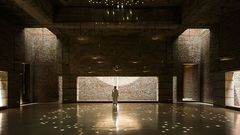Prof. Andres Lepik, Director of the Architekturmuseum der TUM, provided insights into Marina Tabassum's professional background and honored her outstanding achievements with his laudatory speech:
"Marina Tabassum is born and raised in Bangladesh and graduated as an architect in 1994 from the Bangladesh University of Engineering and Technology. From 1995 she worked for 10 years in partnership with Kashef Chowdhury in the architecture studio URBANA. In 1997 they won the competition for the Independence Monument (completed in 2013) and the Liberation War Museum in Dhaka. In addition, while at URBANA, Tabassum designed and saw the completion of several residential buildings in Dhaka.
In 2005, Marina Tabassum founded her own office (MTA), and became a visiting professor at BRAC University in Dhaka, Bangladesh. Her work continued to focus on the possibilities of housing construction under the special conditions of her country. In 2009, together with Schultes Frank Architects (Berlin), they won the first prize in the competition for the Franco-German embassy building in Baridhara, which unfortunately remains unbuilt.
The Urban Planning Council of Abu Dhabi (UPC) commissioned Tabassum to research the contemporary aspects of mosque building based on historical developments, findings that were published in 2013. Since 2012, she has been working in the Panigram Resort in south Bangladesh, which has allowed Tabassum to investigate the use of regional materials and local handicrafts, particularly clay building techniques. In 2015 she became the academic director of the Bengal Institute for Architectural Landscape and Settlements.
With the Bait Ur Rouf Mosque in Uttara in Dhaka, she won the Aga Khan Award for Architecture in 2016 and thus achieved worldwide recognition. With open brick walls and a wide, open interior, Tabassum designed a contemporary reinterpretation of the traditional mosque type. And beyond all the architectural qualities for which it received so much applause it has to be underlined that it is the first mosque to be designed by a female architect in this region.
In 2018 she was invited to make a contribution to the Venice Architecture Biennale. Under the name of 'Wisdom of the Land' she developed an installation that addressed the issue of spatial formation in rural neighborhoods in Bangladesh, especially the traditional courtyard houses, allowing Tabassum to showcase her development of low-cost housing solutions. A related design class on the 2000$ home in Harvard’s Graduate School of Design was published as a book. But the idea of a 2000$ home was not only an academic design exercise, she transformed it into a real project of 20 houses, including a micro-finance system to empower the low-income communities.
In 2019, she exhibited prefabricated houses by Bangladeshi workers at the Sharjah Architecture Triennale, houses that can be dismantled at high tide and rebuild them elsewhere. It is this aspect of the ephemeral and impermanent that shows her capacity to develop innovative design solutions beyond the traditional expectations in the discipline, but rooted in the local knowledge and wisdom.
Given her big success in the last decade it comes as no surprise that Marina Tabassum was invited to international teaching positions for several years, including 2019 at TU Delft and was a guest speaker at many renowned universities, such as: 2017 Harvard, GSD, 2019 Cooper Union, Columbia University, New York and many more.
In 2018 she won the Jameel Prize of the Victoria and Albert Museum together with the artist Mehdi Moutashar.
To sum it up: The starting point for Marina Tabassum's work is first and foremost an intensive examination of the cultural, social, ecological and economic conditions of building in her home country. Bangladesh is one of the most densely populated countries in the world, and is continuously threatened by floods and storms. This are the factors that she chose herself to develop the core elements of her own 'language' in architecture. At the same time, her work and design concepts have been influenced by the personal encounter with important architects such as Balkrishna Doshi, or significant 20th century buildings such as Louis Kahn's government buildings in Dhaka.
There can be no doubt that Marina Tabassum is one of the outstanding, intellectually leading architects of our time as she represents in all her built work as well as in her writings and teaching a clear vision about the power of architecture as an instrument to encounter the global challenges for the next generation.
I think I may speak in the name of our Department and the TUM in general: We all can’t wait to see the opportunity to invite you back to Munich to share your visions with our architecture students and to inspire us.
Congratulations Marina Tabassum!"
